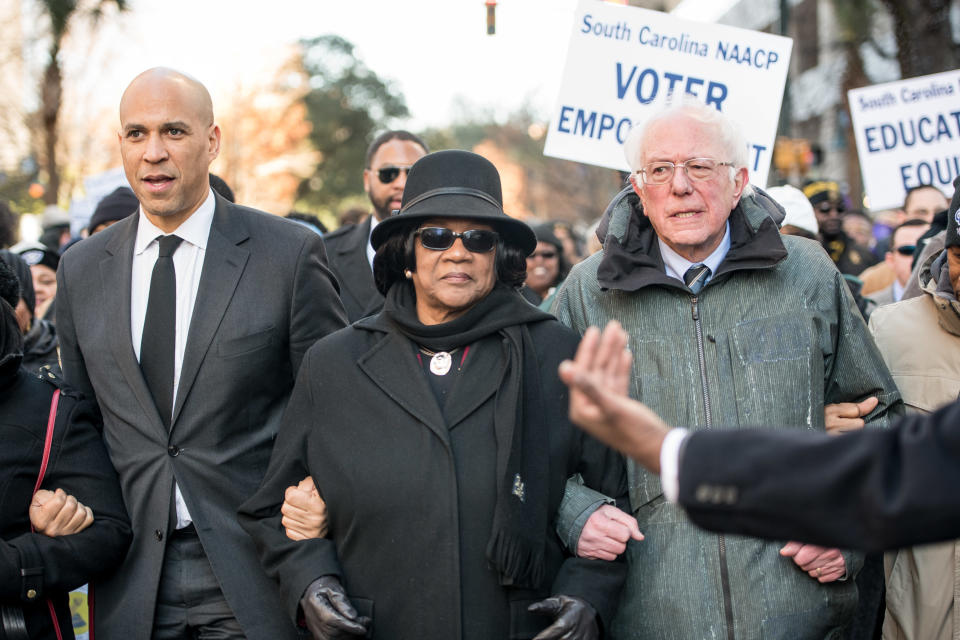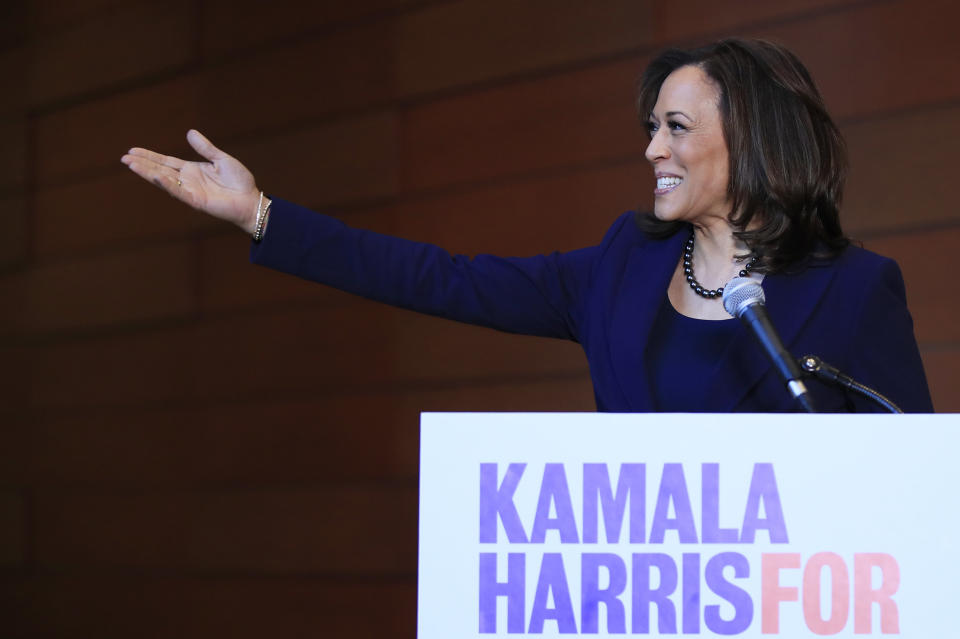The Democratic Race For 2020 Opens With A Battle for Black Voters
COLUMBIA, S.C. ― The battle for black voters in the 2020 Democratic presidential primary has begun in earnest, a sign of how crucial candidates and strategists view the bloc to a successful campaign.
Sens. Bernie Sanders and Cory Booker, two potential candidates, spoke at a Martin Luther King Jr. Day rally organized by the NAACP outside the statehouse here. Sen. Kirsten Gillibrand, former New York Mayor Michael Bloomberg and former Vice President Joe Biden all spoke at Washington, D.C., events sponsored by the Rev. Al Sharpton’s National Action Network. And Sen. Kamala Harris (D-Calif.) jumped into the race at her alma mater in Washington with a logo designed to invoke Shirley Chisholm, the first black woman to run for a major party’s presidential nomination.
The maneuvering, which is starting nearly a year before voters will cast their first primary ballots, is about more than getting a leg up in South Carolina, the third state to vote in the presidential primaries and the only early state with a heavy proportion of black voters. It’s about winning the nomination to face Republican President Donald Trump.
“The voters that will determine the next primary winner are going to be African-American women,” said former South Carolina state legislator Bakari Sellers, expressing a sentiment widely shared by Democratic operatives nationally.
After both President Barack Obama and former Secretary of State Hillary Clinton won the Democratic nomination with a coalition heavy on African-American voters, the new conventional wisdom says the candidate with the most success among black voters ― especially black women, who made up 37 percent of the 2016 primary vote, according to exit polling ― has the simplest path to victory.

“Make no mistake,” Columbia Mayor Stephen Benjamin told the hundreds gathered outside South Carolina’s state Capitol, which still features a prominent monument to the Confederate War dead. “The road to the White House starts in South Carolina.”
The three candidates best positioned to succeed in South Carolina, according to most operatives, are Biden, who retains a network of supporters there from his two prior runs for president, along with Harris and Booker, who are both African-American. Following her 2020 campaign announcement Monday morning, Harris is scheduled to visit the state Friday. (Sen. Elizabeth Warren of Massachusetts is set to make a trip here Wednesday.)
The challenge with black voters may be greatest for Sanders, who faltered here in 2016 after shocking Clinton with a victory in New Hampshire. Since then, Sanders and his allies have worked assiduously to woo black voters, and he’s begun to mention racial discrimination more in his stump speech, bluntly calling Trump a “racist” during his speech here. The 77-year-old Vermonter, who famously dislikes discussing his biography, mentioned he traveled to Washington as a college student and heard King deliver his “I Have a Dream” speech.
“Let us not forget that the title of that march was for Jobs and Freedom,” Sanders said at the rally, invoking the organizers’ call for an increased minimum wage, a federal job guarantee and more affordable housing. “Racial equality must be central to combating economic inequality if we are to build an economy that works for all of us.”
Sanders drew loud applause as he tied his push for progressive policies, such as free college tuition, to the black community, noting African-Americans in particular struggle with student loan debt. Sanders also called for automatic voter registration for every American and “making the right to vote a constitutional right,” as well as ending the war on drugs, minimum sentences and private prisons.
Bishop Roderick Sumpter, a 52-year-old from St. Stevens, said his impression of Sanders improved after seeing him at the rally and a subsequent town hall.
“It makes a difference seeing the person talk than looking at them on TV,” he said. “You can really feel the impression and see the emotion ― that it’s not phony. It’s for real.
Still, operatives in the state remain skeptical of Sanders’ chances.
“I would expect him [Bernie Sanders] to do far worse this year,” said Brady Quirk-Garvan, the chairman of the Charleston Democratic Party. “I don’t think there’s a strong coalition of Sanders supporters in the state, and I think that number dwindles when you’ve got other progressives in the race.”
Booker drew a more subdued response. Speaking less in specifics and more of embracing “courageous empathy” and “spiritual dissatisfaction,” Booker raised his voice as he called on the crowd to be agents of change themselves.
“This is the moment in America where we don’t just celebrate King’s holiday,” he said. “We recommit ourselves to be the agents of change. To be the daring dreamers once again. To be the laborers in our democracy because that is what we need. Do not be discouraged. Because we know that hope is the act of conviction. That despair will not have the last word.”

Harris signaled her intent to aggressively woo black voters not only by launching her campaign on Martin Luther King Jr. Day and invoking Chisholm, but also by holding her first news conference at Howard, the historically black university where she went to college.
In a post on Medium explaining why she was running, Harris said she wanted to live in an America “where black women aren’t three to four times more likely to die in childbirth than white women. A country where for-profit prison businesses — a billion-dollar industry — are a thing of the past.”
But when Harris ― who has a Jamaican-born father and an Indian-born mother ― was asked at Howard how she identified herself, she gently dodged the question.
“I identify as a proud American,” she told reporters.
Biden, who is still debating whether to run, spent the day in Washington speaking at an event organized by Sharpton. At the breakfast, he said America needs to do more to root out the systemic racism “that most of us whites don’t like to acknowledge even exists.”
“We saw it in Charlottesville as Klansmen and white supremacists, literally, and neo-Nazis, literally, slunked out of their dark rooms, their digital hideaways, their crazed and vicious faces literally contorted, illuminated by torchlight,” he said.
While his work on a heavy-handed crime law in the 1990s has alienated younger black activists, he remains a favorite of many older voters. During his appearance, he apologized for a specific 1986 law that imposed harsher punishments on the mostly black users of crack cocaine than it did on the mostly white users of powdered cocaine.
“It was a big mistake that was made,” Biden said, according to The New York Times. “It’s trapped an entire generation.”
Bloomberg, the billionaire Democrat-turned-Republican-turned-independent-turned Democrat, didn’t offer similar regrets for the stop-and-frisk policies he implemented while running New York that were eventually abandoned by his successor and declared unconstitutional. Instead, he pitched the crowd on his record on education and gun control.
“We disagreed on stop-and-frisk, but we agreed on education,” Sharpton said while introducing Bloomberg.
At the National Action Network’s headquarters in Harlem on Monday, Gillibrand said the country needed to have “an honest conversation about the systemic, institutional and daily individual acts of racism in our country,” citing the racial pay gap and disproportionate number of people of color who die during childbirth or are arrested for marijuana possession as key problems.
The burden to fix such problems, she argued, should not be left solely to minority communities.
“It is wrong to ask men and women of color to bear the burdens of every single one of these fights over and over and over again,” she said. “White women like me must share in this burden and commit to using our voices to amplify yours.”
Daniels Marans contributed reporting from New York. Igor Bobic contributed reporting from Washington, D.C.
Love HuffPost? Become a founding member of HuffPost Plus today.
This article originally appeared on HuffPost.

